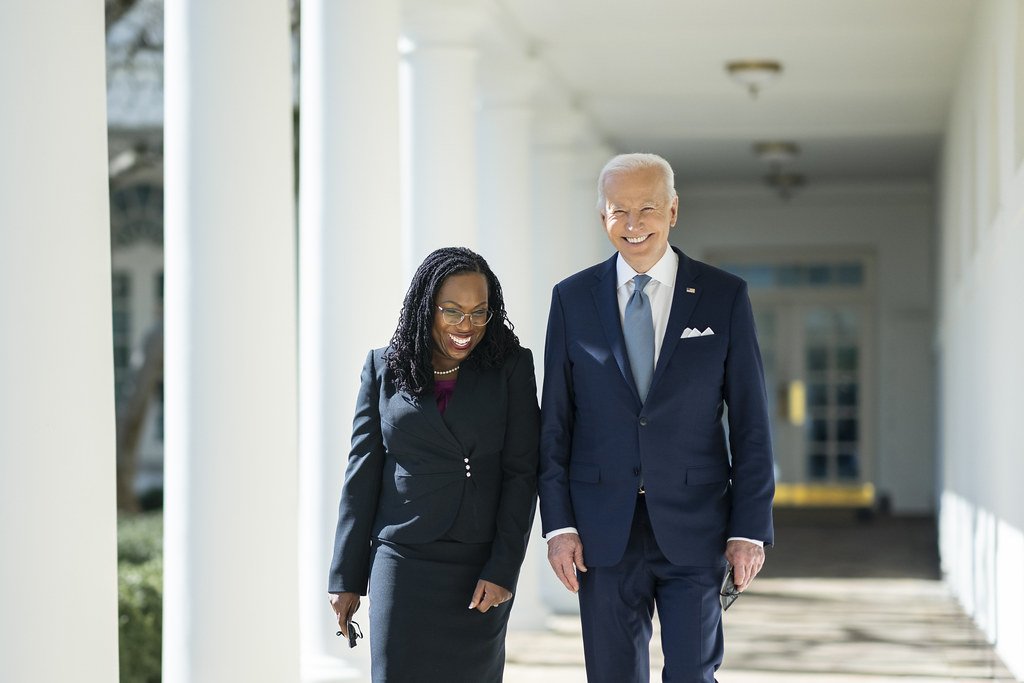Senate confirms Ketanji Brown Jackson as first Black woman on Supreme Court
President Biden and Ketanji Brown Jackson, the next Supreme Court justice, in the White House. Source: Official White House Photo by Adam Schultz on Pexels.com
The Senate voted on April 7 to confirm Judge Ketanji Brown Jackson as the 116th Supreme Court justice, making her the first black woman elevated to the nation’s highest court.
Jackson was confirmed with a bipartisan backing by a vote of 53 yays and 47 nays in the upper chamber, following contentious confirmation hearings the week prior. Three Republicans — Sens. Susan Collins of Maine, Lisa Murkowski of Alaska and Mitt Romney of Utah — joined all 50 Senate Democrats in supporting President Biden’s nominee.
"This is one of the great moments of American history," Senate Majority Leader Chuck Schumer (D-N.Y.) said before the vote. "Today we are taking a giant, bold and important step on the well-trodden path to fulfilling our country's founding promise. This is a great moment for Judge Jackson but it is an even greater moment for America as we rise to a more perfect union."
Jackson is set to take the bench in retiring Justice Stephen Breyer’s place next term, which starts in October. Her confirmation will not shift the ideological balance of the court; she joins a 6-3 conservative majority bench. Jackson is the first Democratic nominee to the Supreme Court in 12 years, since former President Obama’s nominee Elena Kagan was appointed.
Jackson will join three other women — Kagan, Sonia Sotomayor and Amy Coney Barrett — presently serving on the court. Her appointment will mark the first time in the 233-year history of the court that there will be four women, and three people of color, on the bench.
It took 41 days for Senate Democrats to confirm Biden’s nominee. Following through on a key campaign pledge to send the first black woman to the court, Biden announnced his nomination of Jackson on February 25, when he hailed the 51-year-old jurist for her “uncompromising integrity” and “extraordinary qualifications.”
Jackson was elevated to her previous role in the Court of Appeals for the D.C. Circuit last year by Biden, and previously served as the Vice-Chair of the U.S. Sentencing Commission and as a judge on the federal district court in the District of Columbia. The Harvard Law Graduate and former Editor of the Harvard Law Review also worked for two years as an assistant federal public defender — which, if confirmed, would make her the first justice since Thurgood Marshall to have experience in representing criminal defendants.
In the Democratic-controlled chamber, Jackson’s confirmation was all but ensured. Regardless, her confirmation hearings were not without heated exchanges, political theater and exaustive questioning. Particularly, Republicans came under fire for using the hearings as an opportunity to score political points ahead of the midterms, through examining Jackson on her views on hot-button culture war issues largely outside the purview of a jurist, like critical race theory, cancel culture and gender identity. Senators also accused her of being soft on crime and called into question her sentencing history, when she handled many cases involving child pornography offenders. Republicans claimed her sentencing was repeatedly below federal guidelines.
"What the Senate's process turned up was disturbing," Senate Minority Leader Mitch McConnell said of the review of Jackson's record. "In Judge Jackson's courtroom, plain legal text and clear congressional intent were no match for what the judge admits are her personal policy disagreements."
Vice-President Kamala Harris, fulfilling her role as head of the Senate, presided over the vote and said she was “overjoyed” to see the court become more representative of the diversity of the nation.
"I am feeling a deep sense of pride in who we are as a nation, that we just did what we did as it relates to the highest court of our land," she told reporters.
Marking the historic confirmation, Biden hosted Jackson at the White House the day after the Senate vote. The President said Jackson’s confirmation would be remembered as a “moment of real change in American history,” speaking alongside the nominee.
"As I take on this new role, I strongly believe that this is a moment in which all Americans can take great pride," Jackson said at the White House. "We have come a long way toward perfecting our union. In my family, it took just one generation to go from segregation to the Supreme Court of the United States. And it is an honor — the honor of a lifetime — for me to have this chance to join the court, to promote the rule of law at the highest level, and to do my part to carry our shared project of democracy and equal justice under law forward into the future."
